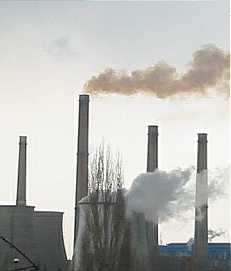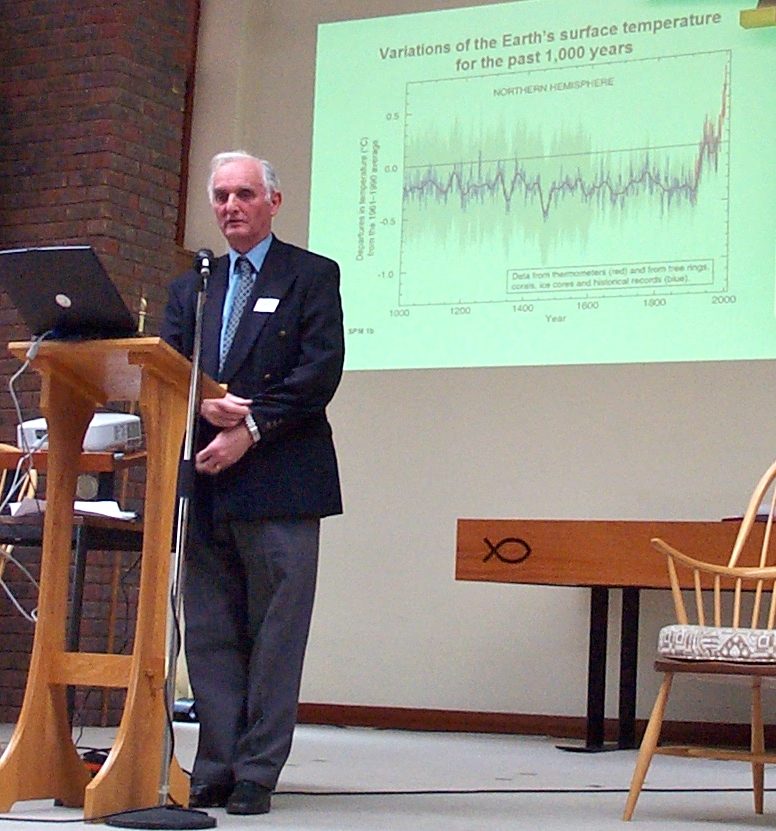|
Gary Yohe
Gary Wynn Yohe is the Huffington Foundation Professor of Economics and Environmental Studies at Wesleyan University, Middletown, Connecticut. He holds a PhD from Yale University. Yohe specializes in Microeconomic theory, Natural Resources, and Environmental Economics. He is a researcher on the economics of climate change and integrated assessment modelling. Among other works, he is an editor of the book "Avoiding Dangerous Climate Change" and co-author (with Edwin Mansfield) of "Microeconomics, Microeconomics: Theory and Applications". He is a senior member of the United Nations Intergovernmental Panel on Climate Change (IPCC) that was awarded a share of the 2007 Nobel Peace Prize with Al Gore. He has been involved with the IPCC since the mid-1990s, has served, among other capacities, as a Lead Author for four different chapters in the IPCC Third Assessment Report, and as Convening Lead Author for the last chapter of the contribution of Working Group II to the IPCC Fourth Assessme ... [...More Info...] [...Related Items...] OR: [Wikipedia] [Google] [Baidu] |
Environmental Economics
Environmental economics is a sub-field of economics concerned with environmental issues. It has become a widely studied subject due to growing environmental concerns in the twenty-first century. Environmental economics "undertakes theoretical or empirical studies of the economic effects of national or local environmental policies around the world. ... Particular issues include the costs and benefits of alternative environmental policies to deal with air pollution, water quality, toxic substances, solid waste, and global warming." Environmental economics is distinguished from ecological economics in that ecological economics emphasizes the economy as a subsystem of the ecosystem with its focus upon preserving natural capital. One survey of German economists found that ecological and environmental economics are different schools of economic thought, with ecological economists emphasizing "strong" sustainability and rejecting the proposition that human-made ("physical") capital ... [...More Info...] [...Related Items...] OR: [Wikipedia] [Google] [Baidu] |
IPCC Third Assessment Report
The IPCC Third Assessment Report (TAR), ''Climate Change 2001'', is an assessment of available scientific and socio-economic information on climate change by the IPCC. Statements of the IPCC or information from the TAR are often used as a reference showing a scientific consensus on the subject of global warming, although a small minority of scientists take issue with the UN assessments (see also Global warming controversy and Politics of global warming). The Third Assessment Report (TAR) was completed in 2001 and consists of four reports, three of them from its Working Groups: Working Group I: The Scientific Basis;TAR Working Group 1 IPCC. Working Group II: Impacts, Adaptation and Vulnerability;TAR Working ... [...More Info...] [...Related Items...] OR: [Wikipedia] [Google] [Baidu] |
Living People
Related categories * :Year of birth missing (living people) / :Year of birth unknown * :Date of birth missing (living people) / :Date of birth unknown * :Place of birth missing (living people) / :Place of birth unknown * :Year of death missing / :Year of death unknown * :Date of death missing / :Date of death unknown * :Place of death missing / :Place of death unknown * :Missing middle or first names See also * :Dead people * :Template:L, which generates this category or death years, and birth year and sort keys. : {{DEFAULTSORT:Living people 21st-century people People by status ... [...More Info...] [...Related Items...] OR: [Wikipedia] [Google] [Baidu] |
Yale University Alumni
Yale University is a private research university in New Haven, Connecticut. Established in 1701 as the Collegiate School, it is the third-oldest institution of higher education in the United States and among the most prestigious in the world. It is a member of the Ivy League. Chartered by the Connecticut Colony, the Collegiate School was established in 1701 by clergy to educate Congregational ministers before moving to New Haven in 1716. Originally restricted to theology and sacred languages, the curriculum began to incorporate humanities and sciences by the time of the American Revolution. In the 19th century, the college expanded into graduate and professional instruction, awarding the first PhD in the United States in 1861 and organizing as a university in 1887. Yale's faculty and student populations grew after 1890 with rapid expansion of the physical campus and scientific research. Yale is organized into fourteen constituent schools: the original undergraduate colleg ... [...More Info...] [...Related Items...] OR: [Wikipedia] [Google] [Baidu] |
Wesleyan University Faculty
Wesleyan theology, otherwise known as Wesleyan–Arminianism, Arminian theology, or Methodist theology, is a Christian theology, theological tradition in Protestant Christianity based upon the Christian ministry, ministry of the 18th-century evangelical reformer brothers John Wesley and Charles Wesley. More broadly it refers to the theological system inferred from the various sermons (e.g. the Forty-four Sermons), theological treatises, letters, journals, diaries, hymns, and other spiritual writings of the Wesleys and their contemporary coadjutors such as John William Fletcher. In 1736, the Wesley brothers travelled to the Georgia colony in America as Christian missionaries; they left rather disheartened at what they saw. Both of them subsequently had "religious experiences", especially John in 1738, being greatly influenced by the Moravian Church, Moravian Christians. They began to organize a renewal movement within the Church of England to focus on personal faith and holiness. ... [...More Info...] [...Related Items...] OR: [Wikipedia] [Google] [Baidu] |
Intergovernmental Panel On Climate Change Lead Authors
{{disambig ...
Intergovernmental can refer to: *Intergovernmentalism *Intergovernmental immunity (other) *Intergovernmental Risk Pool *Intergovernmental organization Globalization is social change associated with increased connectivity among societies and their elements and the explosive evolution of transportation and telecommunication Telecommunication is the transmission of information by various typ ... [...More Info...] [...Related Items...] OR: [Wikipedia] [Google] [Baidu] |
American Economists
American(s) may refer to: * American, something of, from, or related to the United States of America, commonly known as the "United States" or "America" ** Americans, citizens and nationals of the United States of America ** American ancestry, people who self-identify their ancestry as "American" ** American English, the set of varieties of the English language native to the United States ** Native Americans in the United States, indigenous peoples of the United States * American, something of, from, or related to the Americas, also known as "America" ** Indigenous peoples of the Americas * American (word), for analysis and history of the meanings in various contexts Organizations * American Airlines, U.S.-based airline headquartered in Fort Worth, Texas * American Athletic Conference, an American college athletic conference * American Recordings (record label), a record label previously known as Def American * American University, in Washington, D.C. Sports teams Soccer * B ... [...More Info...] [...Related Items...] OR: [Wikipedia] [Google] [Baidu] |
Sustainability Advocates
Specific definitions of sustainability are difficult to agree on and have varied in the literature and over time. The concept of sustainability can be used to guide decisions at the global, national, and individual levels (e.g. sustainable living). Sustainability is commonly described as having three dimensions (also called pillars): environmental, economic, and social. Many publications state that the environmental dimension (also called "planetary integrity" or "ecological integrity") is the most important, and, in everyday usage, "sustainability" is often focused on countering major environmental problems, such as climate change, loss of biodiversity, loss of ecosystem services, land degradation, and air and water pollution. Humanity is now exceeding several "planetary boundaries". A closely related concept is that of sustainable development, and the terms are often used synonymously. However, UNESCO distinguishes the two thus: "''Sustainability'' is often thought of as a lon ... [...More Info...] [...Related Items...] OR: [Wikipedia] [Google] [Baidu] |
Environmental Economists
Environmental economics is a sub-field of economics concerned with environmental issues. It has become a widely studied subject due to growing environmental concerns in the twenty-first century. Environmental economics "undertakes theoretical or empirical studies of the economic effects of national or local environmental policies around the world. ... Particular issues include the costs and benefits of alternative environmental policies to deal with air pollution, water quality, toxic substances, solid waste, and global warming." Environmental economics is distinguished from ecological economics in that ecological economics emphasizes the economy as a subsystem of the ecosystem with its focus upon preserving natural capital. One survey of German economists found that ecological and environmental economics are different schools of economic thought, with ecological economists emphasizing "strong" sustainability and rejecting the proposition that human-made ("physical") capital ... [...More Info...] [...Related Items...] OR: [Wikipedia] [Google] [Baidu] |
Energy Economists
In physics, energy (from Ancient Greek: ἐνέργεια, ''enérgeia'', “activity”) is the quantitative property that is transferred to a body or to a physical system, recognizable in the performance of work and in the form of heat and light. Energy is a conserved quantity—the law of conservation of energy states that energy can be converted in form, but not created or destroyed. The unit of measurement for energy in the International System of Units (SI) is the joule (J). Common forms of energy include the kinetic energy of a moving object, the potential energy stored by an object (for instance due to its position in a field), the elastic energy stored in a solid object, chemical energy associated with chemical reactions, the radiant energy carried by electromagnetic radiation, and the internal energy contained within a thermodynamic system. All living organisms constantly take in and release energy. Due to mass–energy equivalence, any object that has mass when ... [...More Info...] [...Related Items...] OR: [Wikipedia] [Google] [Baidu] |
United States National Academy Of Sciences
The National Academy of Sciences (NAS) is a United States nonprofit, non-governmental organization. NAS is part of the National Academies of Sciences, Engineering, and Medicine, along with the National Academy of Engineering (NAE) and the National Academy of Medicine (NAM). As a national academy, new members of the organization are elected annually by current members, based on their distinguished and continuing achievements in original research. Election to the National Academy is one of the highest honors in the scientific field. Members of the National Academy of Sciences serve '' pro bono'' as "advisers to the nation" on science, engineering, and medicine. The group holds a congressional charter under Title 36 of the United States Code. Founded in 1863 as a result of an Act of Congress that was approved by Abraham Lincoln, the NAS is charged with "providing independent, objective advice to the nation on matters related to science and technology. ... to provide scie ... [...More Info...] [...Related Items...] OR: [Wikipedia] [Google] [Baidu] |
IPCC Fourth Assessment Report
''Climate Change 2007'', the Fourth Assessment Report (AR4) of the United Nations Intergovernmental Panel on Climate Change (IPCC) was published in 2007 and is the fourth in a series of reports intended to assess scientific, technical and socio-economic information concerning climate change, its potential effects, and options for adaptation and mitigation. "Likely" means greater than 66% probability of being correct, based on expert judgement. Sections The report was released in four principal sections: * Contribution of Working Group I (WGI): ''Climate Change 2007: The Physical Science Basis''.. * Contribution of Working Group II (WGII): ''Climate Change 2007: Impacts, Adaptation and Vulnerability''. * Contribution of Working Group III (WGIII): ''Climate Change 2007: Mitigation of Climate Change''. * Contribution of Working Groups I, II, and III: ''The Synthesis Report'' (SYR). Working Group I: The Physical Science Basis The full WGI report was published in March 2007, a ... [...More Info...] [...Related Items...] OR: [Wikipedia] [Google] [Baidu] |





